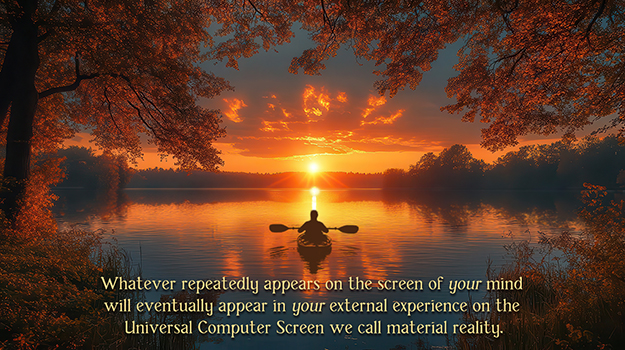Powerful Mind Part 45
Welcome to this week’s Bill Harvey Blog, October 11, 2024.
Created January 19, 2024
Read Powerful Mind 44

Quote from You Are the Universe: Imagine That, Chapter 17 – “Predreaming” by Bill Harvey
My wife Lalita is an avid reader, she reads a couple of books a week. The other day she came across a book she had to mention to me, because of the similarity of its title to my book Mind Magic. The book is called The Magic in Your Mind. It was written by U.S. (Uell Stanley) Andersen, an American football player and businessman. I was fascinated and looked it up and then bought it and am reading it.The book asserts that our imagination controls what happens to us in our lives. This is not a new idea, nor is it just an idea: since antiquity, rare human beings have discovered this way of using their mind, verified that it works, and written about it. The earliest trace of it is in the Vedas going back to memorized but not written texts possibly as early as ~1700 BC or even earlier, finally converted to written form ~500 BC.
In the Sermon On The Mount (~27 CE), Jesus quotes Proverbs 23 Verse 7 “As a man thinketh, so shall he be”.
The Law of Attraction was the book by William Walker Atkinson (1906) which might have inspired Jose Silva to create the Silva Mind Control Method (1977) – or Jose might have discovered it again by himself. In between these books (1961) was when Andersen published his book. The Secret was then published by Rhonda Byrne in 2006. Any of these writers might have been inspired by earlier books, and/or themselves discovered the phenomena and the ways of using them.
I’m finding the writing in Andersen’s book to be inspired and exalting to read. Even though I know these things, the way he explains them is beautiful and lofty. His poetic metaphors and allusions have the ring of truth. I wish I had found his book before he passed away in 1986, it would have been great fun to have conversations with him.
When I was writing Mind Magic in 1972 (published in 1976), I purposely avoided metaphysics and cosmology, because I wanted the book to have universal appeal, including atheists and people of all religions. The methods in Mind Magic are positioned as “useful fictions” and as “lenses” which had been invented by me and tested in my life. The reader is invited to try them and see for themselves that they are pragmatic, i.e. the methods work.
My book You Are The Universe – YATU (2014) I went the other way and rooted my mental methodologies in a picture of the Universe as One Self playing all roles, thus each of our minds is actually the universal mind enjoying the view from one avatar’s perspective. In that book (YATU) I report on my own (mundane and extraordinary) experiences and theorize about how reality works, in order to explain those experiences. And I theorize why The One Self is playing this game.
Chapter 17 of YATU is called “Predreaming” and is all about how to use the mind to cause the future you want, and how to avoid accidentally “ordering poison from the menu” by careless use of these same faculties. An excerpt:
Whatever repeatedly appears on the screen of your mind will
eventually appear in your external experience on the Universal
Computer Screen we call material reality.
You are tuning in these material experiences, ordering them,
Attracting them to you, by dwelling on them.
It makes no difference if your dwelling on them consists of
prayer to get them (your desires), or dread of getting them (your
fears).
The “dwelling-on” places the order, in either case.
Oblivious to our inherited “ordering power”, almost all of us are
using it against ourselves.
The difficulty of using this Predreaming method is not the intense visualization of your most precious dreams actually coming true in real life, that part is fun, it’s almost like daydreaming with purpose. The hard part is keeping your mind from repeatedly drifting into emotively imaging dreaded eventualities that are exactly what you most ardently desire to not happen.
In my novel Pandemonium: Live To All Devices, the character Templegard is the only soldier-spy tested by U.S. Army Intelligence who is able to not think of a green monkey. For most of us, even those of us with relatively high degrees of mental self-discipline, it’s almost impossible to not think of something. The trick is to not avoid thinking of X, but to focus on thinking of Y, and that will work, but requires practice at first.
Any negativity in the mind will tend to bring negativity into your actual life. This is why in previous chapters of Powerful Mind we have oft mentioned quickly turning off internal alarms and moving on to solutions for whatever is causing those alarms. Negativity is a very useful alarm system but when we are in Emergency Oversimplification Procedure (EOP) we tend to wallow in the alarm that is going off, rather than turning it off, thanking it, and moving on to planning how to deal with the thing that is causing the alarm to go off.
The more intensely you detail the future you want to happen the better. This same attention to detail is valuable in preparing contingency plans for what you will do if the very things that you do not want to happen, happen anyway. Not only planning what you will say or do or what your face and body language will communicate, but experiencing it in your imagination, what it will look like and feel like from being inside yourself in that future moment.
Once you have pre-experienced the worst eventualities you will find that some of their sting has been burned out. This will make it easier to casually turn aside if they pop up again in your mind. You will feel prepared and less concerned that such a thing might happen to you. Stoic, courageous, and fatalistic. Resolved.
This can be done every night before going to sleep as regards what might happen in the day ahead. First disarm the undesired outcomes by preparing for them, then put them aside and focus on predreaming the outcomes you do want to happen. If you are comfortable praying, go right ahead. I think of praying as asking for cosmic fire support. I don’t feel comfortable asking the Universe for help in trivial self-serving matters, I feel comfortable asking for the Universe to help in instances where the outcomes I want are beneficial to all concerned, although in the short run some may be more benefitted than others.
Andersen argues that we should strive to change our identification with our ego to our identification with the Universe. This is unquestionably right in my opinion however it can run into friction with one’s atheism or specific religious beliefs (many Jews for example are uncomfortable equating themselves with God). This is why I rephrase his exhortation to identify with our Muse, the “voice” (some guidance might not involve words) inside that gives us the best advice. It comes down to the same thing as Andersen’s advice. And in Mind Magic, the final chapter is all about Identifying with the Universe. Here in Powerful Mind, I’m refining that only slightly into identifying with your Muse, as operationally easier to put into practice. You will by doing so tend to let lower thoughts float downstream without acknowledging them or identifying with them. You’ll instead tend to wait for the Muse and invite it space in which to be heard (or the advice felt and comprehended without words).
More on Key #12 in upcoming posts. In the meantime, ration negativity, and keep track of what percent of your time you detect it inside; and enjoy purposeful daydreaming about the future you want with all of your powers of imagination.
Listen to my latest interview about my book THE GREAT BEING

In this 15-minute interview with Marianne Pestana on KMET ABC News Affiliate, I talk about THE GREAT BEING, my latest book in the Agents of Cosmic Intelligence series.
Listen here.
You may know that I’ve been publishing a sci-fi series called Agents of Cosmic Intelligence, an alternative history of the Universe, in which some of the main characters put into practice the mental methodologies I’ve compiled into my nonfiction books. All of this is aimed at enabling the human race to become more effective and to undo the messes made in the past. By contradistinction to AI, Artificial Intelligence, I think of this as HI, Human Intelligence. I feel that it’s obvious we should be putting at least as much time, money, and effort into HI as into AI – especially if we are fearful of what AI can do to subjugate us.
The books in the series so far take place long ago or in the near future, but what was missing until now is how the Universe began, and what happened on Earth before ~3000 BC. That is now in The Great Being, which is chronologically the first book in the series.
Two reviewers have already written reviews of The Great Being and they really “get” what the whole series is aiming at. I’ve waited for this feeling of someone really getting it for a long time and it is heartwarming to say the least. Here are excerpts and links to the reviews. — Bill
Reviews of The Great Being Warm the Cockles of My Heart

4.2 stars. A compelling and thought-provoking work of science fiction. Harvey’s sprawling, hugely ambitious exploration of consciousness, free will, and the eternal dance between light and darkness is intellectually stimulating and emotionally resonant. The novel’s central message—that all beings, no matter how lost or misguided, are ultimately part of a greater cosmic unity—is a hopeful and uplifting one…Read the full review. — Indie Reader

A singularly unique and eye-opening work of visionary fiction, Blending realms of historical, religious, spiritual, and mythological traditions, this is an ambitious and epically creative read … The full value will be more readily apparent to those readers who can see the threads of allegory, legend, and science woven into one unified whole. Enlightenment and radical self-awareness are powerful undercurrents within the narrative; the role of dogmatic thinking, hierarchical power structures, and the tyranny of knowledge are explored in various ways through the characters’ revelations, opinions, and personalities. The story within a story here is one of psychological development and the real-life pursuit of higher modes of thinking … A wide-reaching and insightful assessment of human civilization and behavior…Read the full review.—Self-Publishing Review / Independent Review of Books

Tonally amusing, aesthetically fearless, and packed with witty observation and divine incident … By turns accessible, erudite, and hallucinogenic, it is an intriguing philosophical romp that cleverly fuses psychedelic science-fiction and fantasy elements with organized religion’s creationist ideologies and the scientific theories of evolutionism … An ambitious, entertaining novel packed with spiritual curiosity, one that will greatly appeal to fans of intelligent science fiction and alternative history stories alike… Read the full review. —BlueInk Review
 Blending spiritual philosophy, alternate history, pre-historic adventure, and brisk life-after-life storytelling, The Great Being is above all a beginning. First comes creation itself, which gets started with the knockout opening line (“The Nothingness felt surprise upon realizing itself.”), … This is the fourth entry published but the first chronological chapter. It shares the swift pacing, spiritual seeking, twisty plotting, and sharply human dialogue of the earlier books, though its focus feels tighter… Read full review, —BookLife by Publisher’s Weekly.
Blending spiritual philosophy, alternate history, pre-historic adventure, and brisk life-after-life storytelling, The Great Being is above all a beginning. First comes creation itself, which gets started with the knockout opening line (“The Nothingness felt surprise upon realizing itself.”), … This is the fourth entry published but the first chronological chapter. It shares the swift pacing, spiritual seeking, twisty plotting, and sharply human dialogue of the earlier books, though its focus feels tighter… Read full review, —BookLife by Publisher’s Weekly.
 In Harvey’s retelling of the creation myth, heavenly agents combat a growing rebellion unfolding on Earth … this story deftly explores human nature—the uplifting qualities and dour traits alike … enthralling tale of humanity’s origins and cosmic espionage… Read full review, — Kirkus Reviews
In Harvey’s retelling of the creation myth, heavenly agents combat a growing rebellion unfolding on Earth … this story deftly explores human nature—the uplifting qualities and dour traits alike … enthralling tale of humanity’s origins and cosmic espionage… Read full review, — Kirkus Reviews
 A real standout…The radically inviting nature of this story brings with it the opportunity to view life and God in an entirely different light…Designed to awaken and introduce new interpretations of spirituality and life meaning. As readers who may not have expected such nuances come to absorb the greater gift of The Great Being‘s message, they will find the radically inviting nature of this story brings with it the opportunity to view life and God in an entirely different light … The story evolves with a reinterpretation of myths, events, and concepts that doesn’t just invite, but demands discussion and insights on the parts of all kinds of spiritual thinkers as the story evolves a unique and compelling flavor of discovery … One of Bill Harvey’s great talents lies not just in his storytelling ability, but his focus on translating life events and history with new interpretations … Readers interested in transformative reading… will find The Great Being‘s message to be one of hope, discovery, and new ways of viewing the universe [and] will find The Great Being a standout. Read the full review. — Diane Donovan for Midwest Book Review
A real standout…The radically inviting nature of this story brings with it the opportunity to view life and God in an entirely different light…Designed to awaken and introduce new interpretations of spirituality and life meaning. As readers who may not have expected such nuances come to absorb the greater gift of The Great Being‘s message, they will find the radically inviting nature of this story brings with it the opportunity to view life and God in an entirely different light … The story evolves with a reinterpretation of myths, events, and concepts that doesn’t just invite, but demands discussion and insights on the parts of all kinds of spiritual thinkers as the story evolves a unique and compelling flavor of discovery … One of Bill Harvey’s great talents lies not just in his storytelling ability, but his focus on translating life events and history with new interpretations … Readers interested in transformative reading… will find The Great Being‘s message to be one of hope, discovery, and new ways of viewing the universe [and] will find The Great Being a standout. Read the full review. — Diane Donovan for Midwest Book Review
Love to all,

Live chat with my avatar now.
 Every conversation is a potential spike in learning, typically even richer than most
Every conversation is a potential spike in learning, typically even richer than most
![]()
![]()









 Blending spiritual philosophy, alternate history, pre-historic adventure, and brisk life-after-life storytelling, The Great Being is above all a beginning. First comes creation itself, which gets started with the knockout opening line (“The Nothingness felt surprise upon realizing itself.”), … This is the fourth entry published but the first chronological chapter. It shares the swift pacing, spiritual seeking, twisty plotting, and sharply human dialogue of the earlier books, though its focus feels tighter…
Blending spiritual philosophy, alternate history, pre-historic adventure, and brisk life-after-life storytelling, The Great Being is above all a beginning. First comes creation itself, which gets started with the knockout opening line (“The Nothingness felt surprise upon realizing itself.”), … This is the fourth entry published but the first chronological chapter. It shares the swift pacing, spiritual seeking, twisty plotting, and sharply human dialogue of the earlier books, though its focus feels tighter…  A real standout…The radically inviting nature of this story brings with it the opportunity to view life and God in an entirely different light…Designed to awaken and introduce new interpretations of spirituality and life meaning. As readers who may not have expected such nuances come to absorb the greater gift of The Great Being‘s message, they will find the radically inviting nature of this story brings with it the opportunity to view life and God in an entirely different light … The story evolves with a reinterpretation of myths, events, and concepts that doesn’t just invite, but demands discussion and insights on the parts of all kinds of spiritual thinkers as the story evolves a unique and compelling flavor of discovery … One of Bill Harvey’s great talents lies not just in his storytelling ability, but his focus on translating life events and history with new interpretations … Readers interested in transformative reading… will find The Great Being‘s message to be one of hope, discovery, and new ways of viewing the universe [and] will find The Great Being a standout.
A real standout…The radically inviting nature of this story brings with it the opportunity to view life and God in an entirely different light…Designed to awaken and introduce new interpretations of spirituality and life meaning. As readers who may not have expected such nuances come to absorb the greater gift of The Great Being‘s message, they will find the radically inviting nature of this story brings with it the opportunity to view life and God in an entirely different light … The story evolves with a reinterpretation of myths, events, and concepts that doesn’t just invite, but demands discussion and insights on the parts of all kinds of spiritual thinkers as the story evolves a unique and compelling flavor of discovery … One of Bill Harvey’s great talents lies not just in his storytelling ability, but his focus on translating life events and history with new interpretations … Readers interested in transformative reading… will find The Great Being‘s message to be one of hope, discovery, and new ways of viewing the universe [and] will find The Great Being a standout.